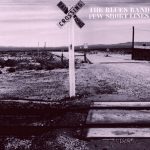
Artist: Steve Fidyk
Album: Battle Lines
Label: Blue Canteen Music
Year Of Release: 2020
Format: FLAC (tracks)
Tracklist:
1. Ignominy (06:00)
2. Battle Lines (05:14)
3. Loopholes (05:27)
4. Thank You (Dziekuje) (04:32)
5. Bebop Operations (05:26)
6. Bootlickers Blues (05:18)
7. Lullaby for Lori and John (05:34)
8. Churn (04:19)
9. Steeplechase (04:31)
10. #Social Loafing (06:12)
11. Sir John (06:36)
Personnel:
Tenor Saxophone – Xavier Perez
Trumpet, Flugelhorn – Joe Magnarelli
Piano – Peter Zak
Bass – Michael Karn
Drums – Steve Fidyk
Battle Lines, the inaugural release of Steve Fidyk’s Blue Canteen Music label, bears the stamp of a rhythm section capable of adroitly assuming multiple identities. During large portions of three amiable, bop-oriented tracks, “Bebop Operations,” “#Social Loafing” and “Sir John,” Fidyk’s drums, bassist Michael Karn and pianist Peter Zak move the music along without any fuss or extraneous effort. Sometimes it’s easy to take them for granted, particularly if your attention is focused on Xavier Perez’s tenor sax or Joe Magnarelli’s trumpet. Conversely, the up-tempo swing of Charlie Parker’s “Steeplechase”—bursting with life and intensely focused—is impossible to ignore. In particular, Karn grabs hold of each and every beat.
Fidyk, Karn and Zak are masters of executing subtle changes in weight and emphasis, giving the impression of expanding and contracting even as the tempo remains stable. They often swell for the course of a solo only to emerge trimmer and more succinct in the one that follows. On Dave Brubeck’s “Thank You, Dziekuje” they surround Perez’s weighty turn and then Fidyk and Karn turn down the heat for Zak’s comparatively composed and concise effort. In other instances, transformations take place within the course of a mere couple of measures. Fidyk’s short bursts of strokes around the kit add intermittent shots of adrenaline to Zak’s solo on the title track (one of seven compositions by the leader) without crowding the pianist. Then there are times when the three of them swap athletic shoes for mud boots and gleefully slog through densely textured tracks. Check out the stunning contrast between the swampy swing of “Churn” and the no nonsense, straight-ahead drive of “Steeplechase”—conveniently positioned as the record’s eighth and ninth cuts—then survey the thickset, high energy jazz-funk of “Loopholes” and the broad, stomping portions of “Bootlickers Blues” and “Battle Lines.”
While it’s fun to untangle the ways in which the rhythm section influence the soloists and vice versa, a few words devoted to the band’s able improvisers are in order. Perez has a knack for expressing himself clearly in a number of dialects. The compressed, sinewy, keening sound that animates “Thank You, Dziekuje,” “Churn” and “Battle Lines” makes a good fit for the material. His pithy, R & B influenced turn during “Loopholes” includes a surprising quote from Bud Powell’s “Parisian Thoroughfare.” “#Social Loafing” is noteworthy for a somewhat breathy tone, short, nicely spaced phrases and patient, measured evolution. Zak shares Perez’s ability to find meaningful ways to shine in a variety of modes. He simultaneously swings and brings on the funk throughout a captivating “Loopholes” improv. The choruses on Blue Mitchell’s “Sir John” resemble the casual precision and sly aplomb of Barry Harris. “Lullaby For Lori and John” (a ballad composed for Fidyk’s parents) and Magnarelli’s flugelhorn are an inspired match-up. In addition to his warm embrace of the melody, Magnarelli’s eight bars following Zak’s solo evinces the vulnerability that is an integral part of his art.
Any examination of Battle Lines would be incomplete without mention of what Fidyk brings to the music when he temporarily relinquishes the role of accompanist/instigator and steps up to the plate. Utilizing an impressive vocabulary, precise stick control at every dynamic level, a capacity to develop recognizable themes while utilizing various components of the drum kit, as well as a proclivity for spontaneity, his brief breaks and extended improvisations add yet another dimension to the record. Four bars of sparse brushwork swing effortlessly and make an ideal set-up to “#Social Loafing.” Fidyk’s drums push and pull at the foundation of “Bootlicker’s Blues” laid down by Karn and Zak. Two choruses on “Sir John” contain surprises even while they develop in a coherent manner. These prime examples make a case for a solo drums recording in Fidyk’s future—or, at least one in which his traps take an even larger role in the compositions and arrangements.
by David A. Orthmann






